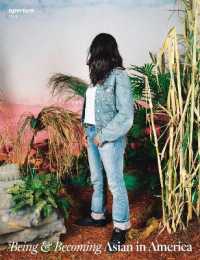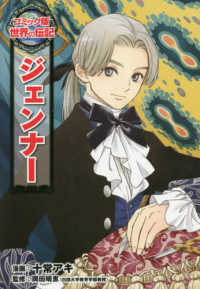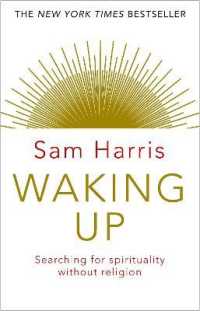- ホーム
- > 洋書
- > 英文書
- > Literary Criticism
Full Description
Retrieves Hegelian speculative experience for literary theory.
The relationship between Hegel and literary theory has for a long time been both contested and paradoxical. On the one hand, "theory" is often skeptical of all that Hegel ostensibly stood for: idealism, systematicity, and identity at the expense of difference. Yet, in spite of itself, literary theory is taken to owe a profound debt to Hegel's philosophy. Robert Lucas Scott's book complicates this account and argues that literary theory has made the mistake of abstracting Hegel's thought from its more dynamic presentation in Hegel's writings, reducing "Hegel" to a series of propositions or positions. Literary theory, Scott argues, misses what is perhaps the greatest innovation of Hegel's philosophy: a presentation of experience that begins precisely by setting aside all preconceptions or prior assumptions. It is on this point that Hegel's philosophy itself approaches literature: its content cannot be simply abstracted from the singular experience of reading it. Only through a mode of reading alive to speculative experience can literary theory become truly Hegelian. Scott's exposition of Hegel offers a model of reading with relevance beyond philosophy: one that is critical without pretensions of mastery and detachment and that honors the singularity of the reading experience without succumbing to the subjectivism of the "postcritical."
The book also includes engagements with the work of Luther, Kant, Marx, Gillian Rose, Fredric Jameson, Robert Brandom, Catherine Malabou, and more in its recovery of Hegel's thought for a critical understanding of our time.
Contents
Preface: Theses on Reading Hegel
Introduction: What Is Living-Dead in the Philosophy of Hegel?
Everyone Has Become a Hegelian
How to Read Hegel
Critique beyond the Limits of Critique, Marx beyond the Limits of Hegel
Part 1: Reading Hegel
Chapter 1: Irony, or What Is
"With What Must the Beginning of Science Be Made?"
Hegel's Phenomenological Method
The "Is"
Woman: The Eternal Irony of the Community?
From the Speculative Reading of the Proposition to the Speculative Reading of the Phenomenology
Commitment Issues
Chapter 2: Recollection, or The Gallery of Images
The Phenomenology as a Gallery of Images
The Fate of Representation
Er-Innerung
Some Examples
Marx's Imagery: Difficult to Swallow
Grey in Grey; Remembering and Repeating
Suspicion or Trust?
Chapter 3: The Spirit and the Letter, or A Series of Letters concerning the Spirit and the Letter within Hegel's Philosophy
Letters against Letter-Bound Thinking
God Is Coal
Hegel and Luther
Part 2: Hegel Reading
Chapter 4: Apres la Lettre: Hegel in a Postcritical Era
Hegel Contra Sociology
Hegel Contra Literary Theory
Theory after Kritik?
The Limits of Recognition
Jameson's Hegelianism?
Speculative Reading and the Critique of Political Economy
The Remains of the Day
Hegel's Defense of Poetry
Knausgaard's Struggle
Acknowledgments
Notes
Bibliography
Index








